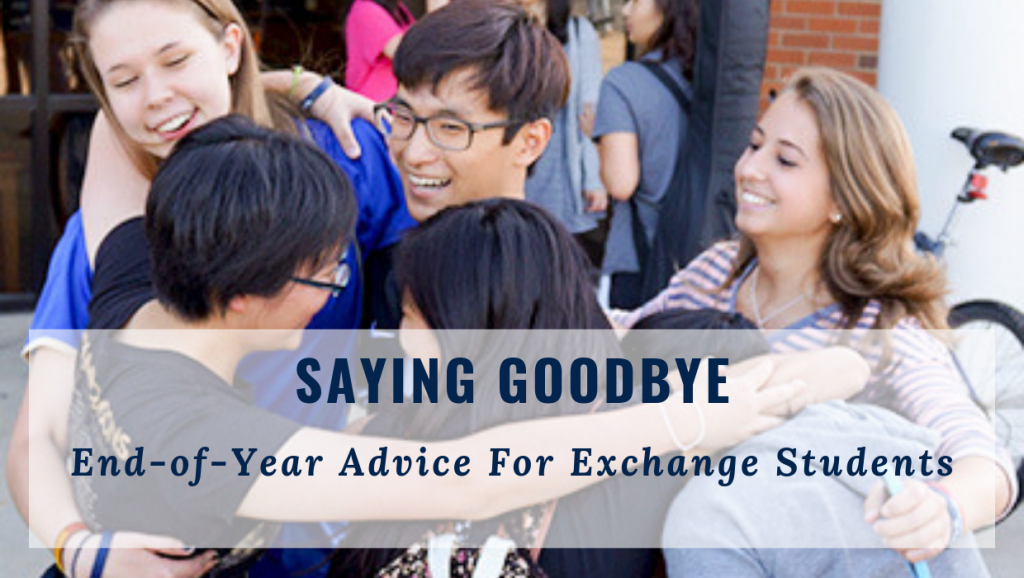Saying Goodbye To Your Host Family
It probably seems as though you just arrived. As the school year is coming to a close, you need to begin preparing now for
your departure.
You will find that saying “Good-bye For Now” has practical steps as well as emotional ones. Below you will find a checklist that covers most of the practical aspects of preparing for departure. However, many students and host families find it difficult to prepare emotionally. They are surprised when they experience intense feelings of sadness, loss, anxiety, and sometimes anger as the date of departure comes closer. Most people believe that if they don’t talk about the feeling, the feelings will go away. Remember that they won’t. The emotions almost always emerge, one way or another.
Your Young Host Brothers and Sisters
If you have young brothers and/or sisters in your host family, it is very important to talk with them about their feelings. Children often form very strong attachments to their international “brother” or “sister.” When they realize that you will be leaving, children may begin to withdraw, misbehave, or push you away to help deal with the “pain” of departure. This may be the first time that a child experiences loss of someone special or “someone leaving” for a long time. Don’t underestimate the powerful feelings of young children. Reassure them that you will always be in their life, just not in the same house. A
special card or gift especially for them will help them say good-bye while still keeping a part of you with them.
Readjusting to “Normal”
As an exchange student in the United States, you enjoyed a “special” status. You were a “special” person in your host family and also at your school. You were “different” from everyone else, and you had to work at “fitting in.” While “fitting in” was sometimes difficult, it was a part of your special experience being an exchange student.
Now you will return home to a “normal” environment. Many exchange students become sad and depressed when they return home because they are no longer “special.” They have this “extraordinary person inside who has had an incredible experience,” but everyone treats them like a “normal” person. Just as you had an adjustment stage to go through when you first arrived in your host family, you will also have an adjustment stage when you return home. It is often called: “Reverse
Culture Shock.”
Some Thoughts That May be Going Through Your Mind
- Will my natural family and friends understand that I’ve changed?
- Will my friends still like me and still be my friends?
- Will people in my home country appreciate my experience?
- Will I be able to adjust to life in my home country again?
Suggestions to Help You with The Last Few Weeks
- Try to Understand and Share Your Feeling: Conflicting emotions are common in exchange students at the end of an exchange. You may be sad about leaving, happy about going home, nervous, and relieved all at once. Pre-departure anxiety shows up in many ways.
- Accept Your Feelings: You will feel sad as you leave your host family and friends, so share those feelings. On the other hand, you may be happy to be return home, but feel sad because your host family will miss you. Accept and share your feelings. They are a normal part of leaving.
- Prepare to Return Home: Discuss your departure plans now with your host family, and make your flight reservation now. You will need their help for many of the practical steps. In addition, discuss your future plans with your host family. Share with them what you will miss about them and your American life. Plan how you will stay in contact.
- Memories … : Spend time with your host family talking about your exchange and things you have experienced. Discuss the good times and the bad times and what you learned from them and how you have changed.
- Prepare for “Reverse Culture Shock”: Think about how you felt when you first arrived in the United States and in your host family. You experienced “Culture Shock”! When you arrive home, you will experience “Reverse Culture Shock,” and it may take awhile to get used to living in your country, with your family, and speaking your native language. Try to prepare yourself for this ahead of time, so it will be a smooth transition.
- Plan Your Departure: Don’t say “good-bye.” Instead, say: “Good-bye for now”! Give yourself plenty of time to pack, send boxes home, and shop. Don’t wait until the last week to do everything. Your departure day should be spent with your host family. Many students leave a letter or a gift for their host family to find when they return home from the airport. This is a wonderful way to express your gratitude and appreciation to them for opening their home and sharing their heart with you.
- When You Arrive Home: In the beginning, some students may experience difficulty in readjusting to their native culture and experience “reverse culture shock.” At first, you may feel excited and relieved about being with your family and friends again. You may find that some things have changed while you were gone, and this may make you feel out of place. You may be faced with different ideas and situations. It’s important to realize that your family and friends have also changed in your absence. While you may be excited to tell about your experience, take some time to listen to the experiences of your
- parents and friends. Important things have also happened to them while you were away.
This year or semester will always be special. Many exchange students describe it as “the best year of my life!” You have learned to open your mind to different cultures and ways of living. You speak English much better now than when you arrived. You have had an experience of a lifetime that will always be a part of who you are.




















About Post Author